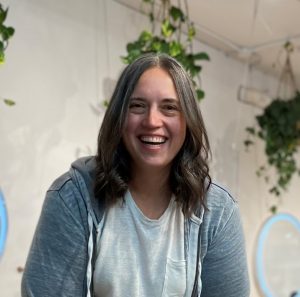Latest News


This year, CFD is celebrating the 20th Anniversary of our inaugural Stepping Stones program! We recently interviewed Tova Nathanson, Clinical Dietitian, about her experience with the program as a former participant and a Journal Club facilitator.
Q: Tell us a little about yourself and your involvement in health professions education.
I’ve been at St. Michael’s Hospital since 2006, first as a dietetic intern/student for a year, then as a clinical dietitian (for almost 18 years now!). I’ve worked mainly in the area of critical care and within the heart and vascular program. I’ve also had a few interim roles in professional practice and education. Teaching students, both clinically, and at the university level, brought me to do my Master’s of Education, and Stepping Stones was a natural progression for me as I worked towards improving my skills as a clinical educator, dietitian and teacher.
Q: How have you been involved in Stepping Stones over the years?
I had the opportunity to participate in Stepping Stones as a participant, and now contribute to the program as a journal club (JC) facilitator. This is my third year as a JC facilitator, and I still love it!
Q: What inspired you to transition from being a participant to taking on the role of a Journal Club Facilitator?
Throughout my time as a Stepping Stones participant, I found the discussions during our sessions (both workshops and JC) very engaging and directly related to my clinical work. Whether it was learning about the latest in health professions education research, to practicing my group facilitation/teaching skills, understanding power and oppression in healthcare education setting, I always found myself in reflection about my practice and working towards a better version of myself. Having the opportunity to continue to learn from each Journal Club participant enables me to continue learning and growing in my field as an educator, and I’ve very thankful for this ongoing personal development opportunity.
Q: Reflecting on your Stepping Stones journey, what standout lessons or insights have you carried into your daily practice?
From best practices in providing feedback, to dealing with difficult dynamics/situations and issues of power and conflict, I can think of myriad of ways that Stepping Stones workshops and the Journal Club have influenced my practice as a health care worker. For instance, I recall having the opportunity to take a mentorship workshop with Karen Leslie as a facilitator. Not only was the session informative, but I found myself immediately immersed in a mentorship community, and the connections I made during that session, have enabled me to continue to receive support as I work to improve our dietetic mentorship program at Unity Health. Furthermore, mentorship was also a topic I chose to present during Journal Club, further embedding myself in the literature/best practices when it comes to successful mentorship experiences. I’ve forever grateful that I had the opportunity to not only learn about best practices in mentorship in the health care setting, but the community that I was able to form and continue to lean on, have made a significant impact in our dietetic mentorship program.
Q: Having been part of Stepping Stones for a substantial time, how would you characterize the program’s evolution?
To me, the program has evolved as a result of participant feedback and needs, and in response to the changing landscape of healthcare work. As always, the Stepping Stones program allows participants to select workshops and learning activities that match their specific needs as educators, clinical preceptors, mentors, scholars and researchers. I loved that the road I took to complete Stepping Stones was very different than my colleagues’ road, and was specific to my personal development. The JC curriculum/articles are always under review, with new, pertinent articles added yearly. I loved having the opportunity to choose the articles I will present, based on my interest. Stepping Stones really is a tailored program that allows participants to fill their unique learning/growth goals.
Q: Turning to the Journal Club component, do you have a particular reading that stands out as a favorite? Can you share the title and discuss why it sparked noteworthy conversations?
I have a few, but most recently, we had an awesome discussion around Malika Sharma’s paper called, “Teaching the social determinants of health: a path to equity or a road to nowhere”. As a collective, we see so many issues of inequality as it pertains to attaining health, but much of our work, although collaborative, is actually quite silo-ed, and we aren’t really able to help our patients move the pendulum towards true, meaningful health. Are we, as health care workers equipped to advocate at the administrative/government level for more funding, for more access to care, for affordable housing etc.? Is this something that we learn about as clinician educators? I love hearing different individuals from different professions and their perspectives around their work and ability to navigate through tough issues such as the social determinants of health. It’s always an interesting discussion, with lots of input from all participants.
Q: What advice do you have for someone who is considering taking Stepping Stones?
Just do it! Stepping Stones is a great opportunity to grow your skills as a preceptor, educator, scholar, advocate, and allows you to travel on a growth journey that is all your own. The connections you make within your cohort will enrich your learning and continue to support your growth well past the duration of program. The program is structured in a way where reflection on your practice and current state sets the foundation to your learning and allows for a tailored approach to your professional growth.
See all Latest News.
